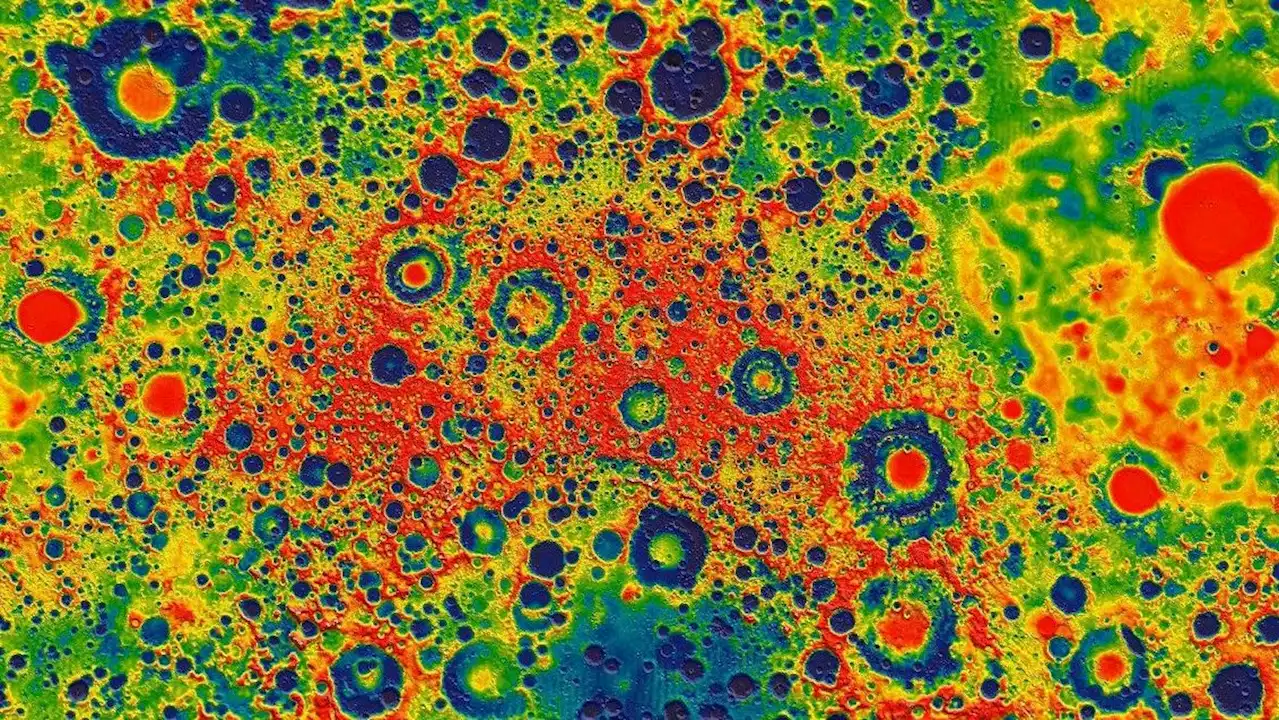Scientists detected a peculiar blob of heat-emitting material buried on the far side of the moon. The most likely culprit is a rock that is very rare outside of Earth.
This mysterious hotspot has a strange origin: It's likely caused by the natural radiation emanating from a huge buried mass of granite, which is rarely found in large quantities outside of Earth, according to new research. On the moon, a dead volcano that hasn't erupted for 3.5 billion years is likely the source of this unusual hunk of granite.
Siegler and his colleague Rita Economos of Southern Methodist University discovered the heat with a new method using microwaves to measure subsurface temperatures via the Chinese lunar orbiters Chang'E 1 and 2. They also used data from NASA's Lunar Prospector and Lunar Reconnaissance Orbiters. "This find is a 50 km-wide batholith; a batholith is a type of volcanic rock that forms when lava rises into the Earth's crust but does not erupt onto the surface," Economos said in the statement."El Capitan and Half Dome, in Yosemite in California are examples of similar granite rocks which have risen to the surface.
United States Latest News, United States Headlines
Similar News:You can also read news stories similar to this one that we have collected from other news sources.
 Scientists set to mark the 'golden spike' of human devastation on EarthA group of scientists will announce the period selected to embody the Anthropocene epoch, a geological age that reflects the devastating impact of humans on the planet
Scientists set to mark the 'golden spike' of human devastation on EarthA group of scientists will announce the period selected to embody the Anthropocene epoch, a geological age that reflects the devastating impact of humans on the planet
Read more »
 'Hundred times' more probability of finding water on exoplanets, says new studyRutgers University scientists believe there might be many more Earth-like exoplanets with liquid water.
'Hundred times' more probability of finding water on exoplanets, says new studyRutgers University scientists believe there might be many more Earth-like exoplanets with liquid water.
Read more »
 New health warnings after hottest days on Earth recordedTriple-digit temperatures quickly became the norm in countless cities with sweltering conditions that lasted for days and culminated into what scientists say have become the hottest days ever record on Earth in 125,000 years. Is there a way to turn the weather extremes around? NBC’s Angie Lassman reports in this week’s Sunday Focus.
New health warnings after hottest days on Earth recordedTriple-digit temperatures quickly became the norm in countless cities with sweltering conditions that lasted for days and culminated into what scientists say have become the hottest days ever record on Earth in 125,000 years. Is there a way to turn the weather extremes around? NBC’s Angie Lassman reports in this week’s Sunday Focus.
Read more »
 That 'Weird Shrimp From Canada' Less Swole Than We Thought, Scientists SayA new study offers new evidence that Anomalocaris canadensis, an ancient ocean predator, was too weak to hunt and crush trilobites.
That 'Weird Shrimp From Canada' Less Swole Than We Thought, Scientists SayA new study offers new evidence that Anomalocaris canadensis, an ancient ocean predator, was too weak to hunt and crush trilobites.
Read more »
 Antarctic Ice Reaches 'Record-Smashing Low,' Alarming ScientistsA grim NOAA report reveals that Antarctic sea ice levels have reached a record wintertime low — and a drastic year-over-year decrease.
Antarctic Ice Reaches 'Record-Smashing Low,' Alarming ScientistsA grim NOAA report reveals that Antarctic sea ice levels have reached a record wintertime low — and a drastic year-over-year decrease.
Read more »
 Scientists: Lake Tahoe is regaining legendary clarityThanks to zooplankton, the lake is clearest in 35 years.
Scientists: Lake Tahoe is regaining legendary clarityThanks to zooplankton, the lake is clearest in 35 years.
Read more »
